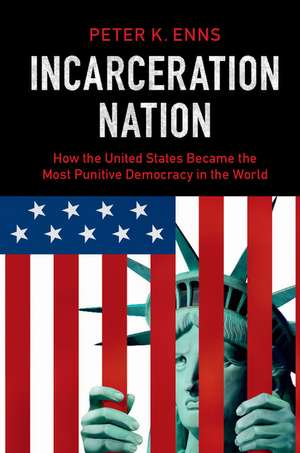Incarceration Nation: How the United States Became the Most Punitive Democracy in the World
Autor Peter K. Ennsen Limba Engleză Paperback – 20 mar 2016
| Toate formatele și edițiile | Preț | Express |
|---|---|---|
| Paperback (1) | 131.72 lei 22-36 zile | |
| Cambridge University Press – 20 mar 2016 | 131.72 lei 22-36 zile | |
| Hardback (1) | 572.71 lei 43-57 zile | |
| Cambridge University Press – 21 mar 2016 | 572.71 lei 43-57 zile |
Preț: 131.72 lei
Nou
Puncte Express: 198
Preț estimativ în valută:
25.20€ • 26.39$ • 20.86£
25.20€ • 26.39$ • 20.86£
Carte disponibilă
Livrare economică 17-31 martie
Preluare comenzi: 021 569.72.76
Specificații
ISBN-13: 9781316500613
ISBN-10: 1316500616
Pagini: 184
Ilustrații: 43 b/w illus. 14 tables
Dimensiuni: 153 x 229 x 11 mm
Greutate: 0.29 kg
Editura: Cambridge University Press
Colecția Cambridge University Press
Locul publicării:New York, United States
ISBN-10: 1316500616
Pagini: 184
Ilustrații: 43 b/w illus. 14 tables
Dimensiuni: 153 x 229 x 11 mm
Greutate: 0.29 kg
Editura: Cambridge University Press
Colecția Cambridge University Press
Locul publicării:New York, United States
Cuprins
1. Introduction; 2. A forgiving or a punitive public?; 3. Who led whom?; 4. Explaining the public's punitiveness; 5. Democracy at work? Public opinion and mass incarceration; 6. Punitive politics in the states; 7. Conclusion.
Recenzii
'Did Richard Nixon, Barry Goldwater, and other elected officials generate the 'tough on crime' political attitudes that led to the rapid rise in incarceration beginning in the 1970s? Or was it a more general trend reflecting shifting media portrayals of crime and powerful forces in public opinion? In this path-breaking and rigorous analysis, Peter Enns answers these questions. And he also gives cause for hope that, with shifting public understandings of the nature of crime and the appropriate response to it, our long national infatuation with incarceration may have already come to an end. It is a methodological tour de force, of interest not only to those concerned with criminal justice, but also to those interested in a more general question: what is, and should be, the role of public opinion in determining public policy outcomes in a democracy?' Frank R. Baumgartner, Richard J. Richardson Distinguished Professor of Political Science, University of North Carolina, Chapel Hill, and coauthor of The Decline of the Death Penalty and the Discovery of Innocence
'This is an historic moment for criminal justice reform, with unprecedented bipartisan support for reducing prison populations. But in order to effectively dismantle mass incarceration, we must understand the forces that got us there. Peter Enns masterfully dissects the political and social processes that led to the US becoming the world's leader in incarceration, illustrating the central importance of mass public opinion in driving the punitive turn in correctional policy. The book is a welcome addition to the scholarship on mass incarceration, challenging many prevailing views and giving us important new insights on the past, present, and future of criminal justice reform.' Devah Pager, Harvard University
'This book delivers a substantial and important account of the influence of mass opinion on criminal justice policy over more than half a century, with broader implications for the study of democratic politics. Enns's emphasis on dynamics develops a novel and distinctive approach to understanding the politics of crime in the United States that is also highly relevant to the rise of penal populism across a number of advanced democracies.' Will Jennings, University of Southampton
'It is said every society gets the criminals it deserves, but we get the justice system that we want. In this highly impressive new book, Peter Enns demonstrates precisely this: the growth of the incarceration nation was no accident and we are all implicated. The good news is that public opinion is changing dramatically on this issue. Enns's important analysis gives me great hope that if we can build it, we can also knock it down.' Shadd Maruna, Dean, Rutgers School of Criminal Justice
'This is an historic moment for criminal justice reform, with unprecedented bipartisan support for reducing prison populations. But in order to effectively dismantle mass incarceration, we must understand the forces that got us there. Peter Enns masterfully dissects the political and social processes that led to the US becoming the world's leader in incarceration, illustrating the central importance of mass public opinion in driving the punitive turn in correctional policy. The book is a welcome addition to the scholarship on mass incarceration, challenging many prevailing views and giving us important new insights on the past, present, and future of criminal justice reform.' Devah Pager, Harvard University
'This book delivers a substantial and important account of the influence of mass opinion on criminal justice policy over more than half a century, with broader implications for the study of democratic politics. Enns's emphasis on dynamics develops a novel and distinctive approach to understanding the politics of crime in the United States that is also highly relevant to the rise of penal populism across a number of advanced democracies.' Will Jennings, University of Southampton
'It is said every society gets the criminals it deserves, but we get the justice system that we want. In this highly impressive new book, Peter Enns demonstrates precisely this: the growth of the incarceration nation was no accident and we are all implicated. The good news is that public opinion is changing dramatically on this issue. Enns's important analysis gives me great hope that if we can build it, we can also knock it down.' Shadd Maruna, Dean, Rutgers School of Criminal Justice
Descriere
Incarceration Nation demonstrates that the US public played a critical role in the rise of mass incarceration in this country.











